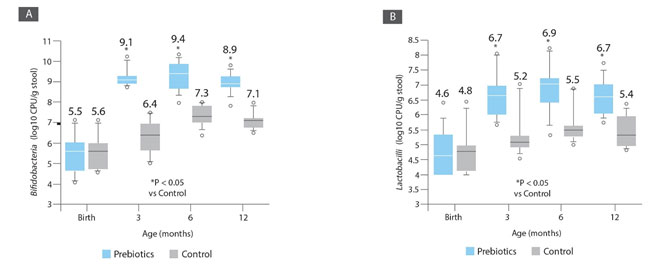Role of prebiotic oligosaccharides in early microbial colonization and long-lasting bifidogenic effects
Background
Intestinal microbiota plays a crucial role in postnatal development of the immune system. Many years of research suggests that breastfeeding is the best route through which optimal growth can be achieved, which helps with the development of a healthy and balanced immune system. Consequently, many attempts have been made to influence the intestinal microbiota composition of formula-fed infants toward that found during breastfeeding. Oligosaccharides found in breast milk exert a prebiotic effect in the intestine of the infant. Due to its complex structure it is difficult to replicate it all in the formula feeds. Since 2002, infant formula's containing a specific mix of scGOS:lcFOS in 9:1 ratio have shown several benefits such as reduction in allergic episodes and illnesses, reduction in infectious episodes etc.
Early breast feeding is known to heavily influence the initial imprinting of the intestinal microbiota. However, there is not much data showing the impact of formula feeding from day 1 of life on infant gut microbiota.
Aim:
To evaluate the influence of a specific prebiotic mixture administered from the first day of life on the development of intestinal microbiota in formula-fed infants with a focus on bifidobacterial and faecal counts during and after intervention with prebiotics.
Study design:
A randomised, double-blind placebo controlled explorative intervention study with 2 intervention groups.
|
Study group |
Type of feeding |
|
Control group |
Standard formula without prebiotics (n=10) |
|
Test group |
Formula supplemented with scGOS:lcFOS in the
amount of 0.8 g/100ml (n=10) |
Infants in both the groups were fed their respective formulae from birth until 6 months. Post 6 months, regular follow-on formula was fed to infants in both groups.
Parameters assessed:
- Clinical examinations were done at birth, 3, 6 and12 months of age.
- Stool samples were analysed for determining the count of Lactobacilli and Bifidobacteria.
- Faecal pH was also assessed for both the groups.
Result and discussion:
- The counts of Bifidobacteria and Lactobacilli increased during the first 3 months in both groups (P< 0.0001) and remained stable afterwards (P > 0.05).
- Starting from 3 months of age, the counts of both Bifidobacteria and Lactobacilli were evaluated and were found to be higher in the prebiotic group (P < 0.013). This difference persisted even after discontinuation of the prebiotic supplementation at 7 months of age (Figure 1).
- Stool pH was higher in the control group as compared to supplemented group (P = 0.0005).

Figure1: Influence of prebiotic supplementation on the number of Bifidobacteria (Figure A) and Lactobacilli (Figure B) in faeces.
Conclusion:
Early colonization of the intestine might have long-lasting effects on the composition of the intestinal microbiota. Infant formulas when supplemented with a mixture of scGOS:lcFOS in the ratio of 9:1 has a long lasting impact on the and counts in infants.
Reference:
- Salvini F., Riva E., et al. A Specific Prebiotic Mixture Added to Starting Infant Formula Has Long-Lasting Bifidogenic Effects. J Nutr. 2011 Jul; 141(7): 1335–1339.
IMPORTANT NOTICE:
Breast milk is best for babies. At Danone, we support breast feeding and believe that breast milk is the best food for babies as the sole source of nutrition for the first 6 months of life and is recommended to be continued until 2 years with the introduction of appropriate complementary foods after 6 months of age.
MOTHER’S MILK IS BEST FOR YOUR BABY
The World Health Organization (WHO)* has recommended that pregnant women and new mothers be informed of the benefits and superiority of breast-feeding, in particular, the fact that it provides the best nutrition and protection from illness for babies. Mothers should be given guidance on the preparation for and maintenance of lactation, with special emphasis on the importance of the well-balanced diet both during pregnancy and after delivery. Unnecessary introduction of partial bottle feeding, or other foods and drinks should be discouraged since it will have a negative effect on breast-feeding. Similarly, mothers should be warned of the difficulty of reversing a decision not to breastfeed. Before advising a mother to use an infant formula, she should be advised of the social and financial implications of her decision. For example, if a baby is exclusively bottle-fed, more than one can (500g) per week will be needed, so the family circumstances and cost should be kept in mind. Mother should be reminded that breast milk is not only the best but also the most economical food for babies. If a decision to use infant formula is taken, it is important to give instruction on correct preparation methods, emphasizing that unboiled water, unsterilized bottles or incorrect dilution can lead to illness.
*See: International Code of Marketing of Breast Milk Substitutes, adopted by the World Health Assembly in Resolution WHA 34.22, May 1981.
Importance of Breastfeeding:
Importance of Breastfeeding: (i)Immediately after delivery, breast milk is yellowish and sticky. This milk is called colostrum, which is secreted during the first week of delivery. Colostrum is more nutritious than mature milk because it contains more protein, more anti-infective properties which are of great importance for the infant's defense against dangerous neonatal infections. It also contains higher levels of, Vitamin 'A', (ii) breast miIk- A) is, a complete and balanced food and provides all the nutrients needed by the infant [for the first six months of life] (B) has anti-infective properties that protect the infants from infection in the early months (C) is always available; (D) needs no utensils or water (which might, carry germs) or fuel for its preparation, (iii) breastfeeding is much cheaper than feeding infant milk substitutes as the cost of the extra food needed by the mother is negligible compared to the cost of feeding infant milk substitutes, (iv) mothers who breast-feed usually have longer periods of infertility after child birth than non-lactators; (b) details of management of breast feeding, as under:- (i) breast-feeding- (A) immediately after delivery enables the contraction of the womb and helps the mother to regain her -figure quickly; (B) is successful when the infant suckles frequently and the mother wanting to breast-feed is confident in her ability to do so (ii) in order to promote and support breast-feeding the mother’s natural desire to breast feed should always be encouraged by giving, where needed, practical advice and making sure that she has the support of her relatives. (iii) adequate care for the breast and nipples should be taken during pregnancy. (iv) it is also necessary to put the infant to the breast as soon as possible after delivery, (v) let the mother and the infant stay together after the delivery, the mother and her infant should be allowed to stay together (in hospital, this is called "rooming-in"); (vi) give the infant colostrum as it is rich in many nutrients and anti-infective factors protecting the infants from infections during the few days of its birth; (vii) the practice of discarding colostrum and giving sugar water, honey water, butter or other concoctions instead of colostrum should be very strongly discouraged; (viii) let the infants suckle on demand; (ix) every effort should be made to breast-feed the infants whenever they cry; (x) mother should keep her body and clothes and that of the infant always neat and clean.
Breast-feeding is the best form of nutrition for babies and provides many benefits to babies and mothers. It is important that, in preparation for and during breast-feeding, you eat a healthy, balanced diet. Combined breast and bottle-feeding in the first weeks of life may reduce the supply of your own breast-milk and reversing the decision not to breast-feed is difficult.
Always consult your Healthcare Professional for advice about feeding your baby. The social and financial implications of using infant formula should be considered. Improper use of an infant formula or inappropriate foods or feeding methods may present a health hazard. If you use infant formula, you should follow manufacturer's instructions for use carefully - failure to follow the instructions may make your baby ill.
Published by:
Nutricia International Private Limited
Building A, unit no. 304, 3rd Floor,
Agastya Corporate Park, Kamani Junction,
L.B.S. Marg, Opp. Fire Brigade,
Kurla (West), Mumbai 400070


